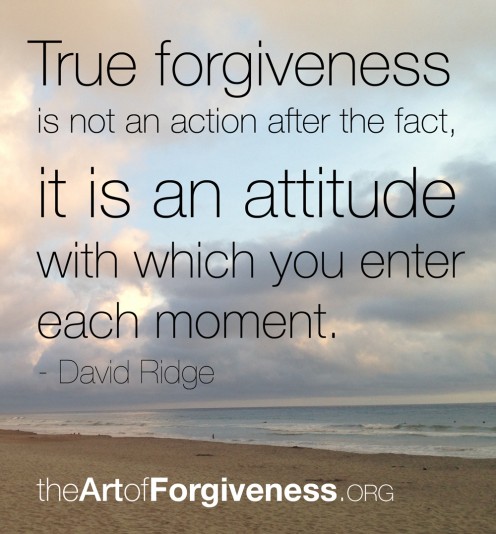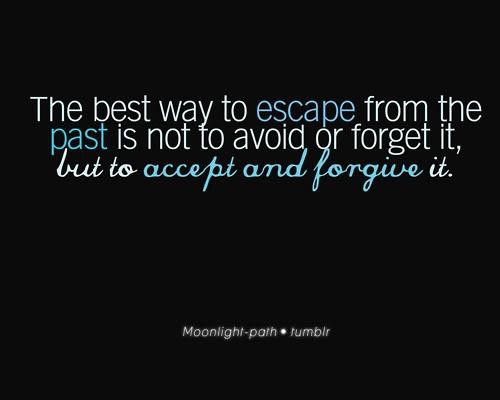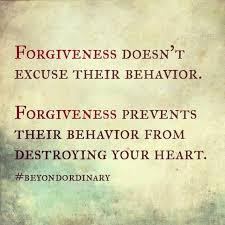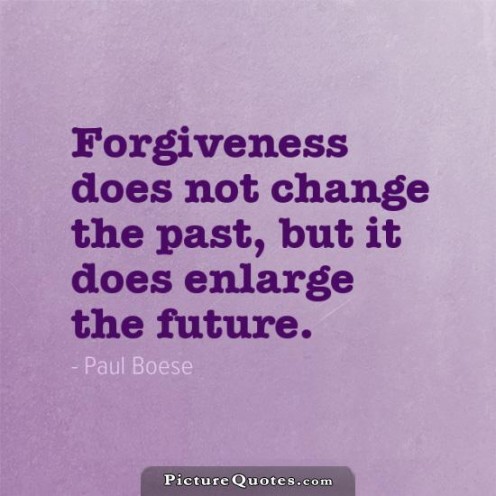How to Forgive From the Heart--Troubleshooting 6 Issues
Forgiveness is an Attitude

The Seven Deadly Virtues, Indeed
What You'll Find In This Article That will Help You Resolve Emotional Pain
"I find that humility means to be hurt. It's not the earth the meek inherit, it's the dirt." - Sir Mordred, "Camelot" movie (1967). While many of us can relate to this statement, there is help! Try out the suggestions in this article to begin conquering the pain of bitterness.
This article is for troubleshooting when you just can't seem to forgive, no matter what. See Part One for how to actually forgive, including a discussion of what forgiveness is - and isn't. To recap, forgiveness is not saying everything is OK when it's not. It is giving over your right to hurt someone else for hurting you, and so refusing to pay evil for evil.
In this article, I'll cover some common hang-ups people have about forgiving. Here they are:
1) When someone does the same bad things to you over and over. What then? Should you still forgive them? Do they deserve it?
2) When you are faced with the choice of forgiving things that deserve serious retribution...maybe even the death penalty
3) When you must forgive God. Is it OK to be mad at God?
4) When you must forgive a stranger, whom you know nothing about besides that they hurt you.
5) When you must forgive exactly the same offense repeatedly, because the feelings won't go away for more than a few days or hours.
6) When you can't trust the Creator to take care of your heart, or the situation that hurts - and the pain never stops.
So, let's jump right in. This won't get any easier, but it won't become any less necessary, either, for you to grow into healthy relationships. Forgiveness will probably come more naturally the more you practice. This is true even though things people do will still hurt, and you will still be faced each time with the choice of whether to hang onto your rights - and your pain - or let go. As you practice, you will see that the choice to let go is always the right choice.
Returning Good for Evil

Problem 1 - Forgiving the same things over and over, from the same stupid or evil person.
Let's face it - some people are more evil than others. I'm not talking about the person with poor judgment, who continuously makes messes for himself and everybody else because he has no foresight. (That may be foolish, but not evil.) I'm talking about the kind of heart that likes seeing others in pain. When faced with such a person, you still need to forgive. Remember, to not forgive is to choose to chain yourself at the wrist with the person who wronged you. Furthermore, that person gets to control your attitude, telling you what to think and how to think it, and giving you pain with every heartbeat. If this is what you want, go right ahead and hang onto the pain. You'll just be giving the evil person what they want, gratifying them. If you want to be free, you've got to forgive.
So, the question here isn't whether the evil person deserves forgiveness. Practically no one does. Do you? If you objectively evaluate whether or not you deserve someone's forgiveness, what do you see? Go ahead, evaluate. Not just for one thing, or two things, or the smallest things...but for everything - every way you have ever hurt someone, whether you meant to or not. Throw in a few extras, for those times when maybe someone didn't tell you how they really felt, but forgave you anyway. Being honest with yourself, you can see that forgiveness is usually not merited - it is part of grace. It has nothing at all to do with how evil the act was that you're forgiving . Instead, it has everything to do with keeping your soul and heart in working order. So, yes, go ahead and forgive for the same stupid things, however many times they occur. (Matthew 18:21-22.)
This goes for the foolish person, too. It's the same story, from a different angle. Sometimes, you may be the foolish person, and while you may not merit your own forgiveness, it doesn't do any good to continue to hold onto your disappointment in yourself. When you find it difficult to forgive yourself, consider getting an objective opinion from someone else, on how bad the situation really is. They'll be able to help you break down the problem, and may be able to help you understand that it is more unhealthy to continue to punish yourself through withholding forgiveness, than to extend grace and give yourself another chance to get things right. Refusing to forgive yourself also hurts those around you, because it makes you more judgmental and angry, and can lead to deep depression. In other words, refusing to forgive yourself compounds the original issue.
Forgiving, Not Just Escaping

A Note on Abusive Situations
If you or your children are in an abusive situation, forgiving your abuser does not mean that you should stay and take more of the same. It means that when you leave the abuse behind, you also leave the bitterness and emotional pain of it behind. To put it another way, you leave your abuser with your emotions, as well as physically, and by forgiving him, you don't allow him to come with you into your future. If you don't bother to forgive him, there's no point in leaving him in the first place. If you don't forgive, you might as well stay and take more of the same, because his memory will just come with you and dictate everything you do, think, and feel, and you won't have a new life at all. You'll find a way to recycle the life you had. If you are being abused, get help. Contrary to your probable feelings, you are not responsible for your abuser's attitude or for the abuse itself. Each person is responsible for his own actions and attitude. So forgive yourself for allowing yourself (or your children, etc.) to get into the abusive situation, and move on.
Is the Creator Really a Righteous Judge?
According to the Scriptures, yes, He is. And if that doesn't answer it for you, you'll have to take it up with Him. Go ahead and ask Him; He won't mind. (See Hearing God's Voice, Part One and Two, for advice on having a dialogue with your Creator.) Here are some points to consider:
1) The Creator's proclaimed nature - His glory - is all the things people wish for in a close friend or lover. (See Exodus 33:18-23, 34:5-8.)
2) In spite of His being strict, even a quick reading of the book of Deuteronomy reveals that He is more interested in mercy than in punishment (not to be confused with discipline). Furthermore, He is fair, giving plenty of warning before He acts, even in much-needed discipline. In His Word, the Holy Scriptures, He's already given you all the information you need in order to make up your mind about Him - and it's your job to do so. It's not His job to re-iterate Himself to anyone who has a bad attitude. He'll help you with your attitude, if you want it, but He's probably not going to play your games, and reveal Himself while allowing you to keep your bad attitude. Would you? If you are unfamiliar with what He says about Himself, you can start with the Gospel of John. This will give you a nice overview of Jesus (God the Son), His life, and His goals.
As far as attitudes go, He doesn't expect you to like everything that happens. Feeling angry, disappointed, or "negative" is not in itself wrong. Forgiving, or refusing to forgive, is the thing that matters. And that thing you're most upset about - is it just possible it wasn't His plan for it to happen? Try to keep an open mind. If you're just looking for someone to blame, you're probably not going to make progress, in forgiveness or life.
3) He prefers loving relationships to adversarial relationships. He designed people for relationship; that's the whole point of your being created. And He wants to get to know you, personally - and for you to reciprocate. It was never His plan for you to feel alone. Maybe you don't think you want to get to know Him. That's OK. Take your time, and make sure you have good reasons for thinking so. It's ultimately your decision; He won't force you. (More on forgiving your Creator, below.) He wants you to take a good long look at Him as He is, not as you think He is. (Did you get everything right about even your best childhood friend? What makes you think you've got it all right about Him?) (Psalm 31:19-24.)
4) The Creator, who made all men, is more disappointed than you are that some don't behave themselves. Provided they don't get their hearts right with Him first, He will be forced to give them what they've asked for - which is total separation from Himself, and all He is and can provide. Remember, He is a gentleman, and doesn't force anyone to have acquaintance with Him.
Problem 2 - Forgiving Things That Deserve Serious Retribution
Some things hurt worse than others. Therefore, some things are harder to forgive. Things like child abuse, rape, and murder may seem less deserving of your forgiveness than things like a white lie, a slight, or a harsh word. But remember that forgiveness is not based on the other person's merit. It's based on grace, and it is the only way to keep your heart and soul in working order, so that you can live a full life.
Each time you refuse to forgive, you pack up the nasty situation in a keepsake box and put it in your pocket, and it stays with you. You'll find yourself dwelling on it, taking it out to go over several times a day...handling it just as devotedly as something of great value. All the while, you are giving your abuser or adversary permission to hurt you.
Forgiving something particularly bad doesn't mean that you don't do anything about it. If the person you are forgiving deserves to go to prison, perhaps it is your duty to prosecute them for their crime. But you should probably draw the line at executing them yourself. It is doubtful that you can do this lawfully, and it is also doubtful that you can do it with a pure heart. In effect, if you punish the person yourself, you will only be returning evil for evil, allowing yourself to be dragged down to their level. Instead, in forgiving them, you are giving up your right to punish them personally, according to your own fantasies. And if these fantasies make you feel guilty, give them over to the Creator, and forgive yourself for having them. It may be perfectly legitimate to wish the person's demise - but you need to let Jesus, the only right and completely just judge, make out the sentence - not you. Chances are good that you have neither the wisdom nor the foresight to see all the details that need to go into making out such a sentence - even if the perpetrator were yourself. For example, can you see into the recesses of the evil person's heart, and prove that they are evil? - can you see all the thoughts, plans and wishes that went into their act? Can you say with certainty that you know what their motive was, and that you also see how every detail of their life dovetails with the lives they have touched, or with those by whom they have been touched? Can you say you understand what their pains are? If you cannot answer yes to all of these questions, you are not an entirely fit judge. Only the Creator can see all of these things, and can call things as they are. (Romans 12:17-21).
Be Freed by Forgiving

Problem 3 - What About Forgiving God?
Lots of people are mad at God. You're probably no exception. Some people have guilt over this, believing it's wrong to admit to being mad at God. Let's think this over for a minute. Anger is just an emotion, right? Yes, it can lead to actions, but in itself, it's simply an emotion. Your Creator has emotions, too. In fact, He created you with emotions, so that you can reflect more of who He is. He sometimes was angry with the nation of Israel, as well as others, and wasn't afraid to tell them so. He was angry over many of the same things that make us angry - cheating, stealing, lying, various other injustices, and hard-heartedness. (He tells us about these things in His Word.) So...is it conceivable that He already knows you're mad at Him, and that He's OK with this? Because it is like Himself and it helps keep your heart pure, He wants you to forgive Him and everyone else anytime you feel wronged, but He is actually OK with the fact that you have emotions, and exercise them. If you refused to acknowledge your emotions, you wouldn't be as He designed you to be. You would be malfunctioning.
If you have a problem with something you believe God caused, or allowed, get it out between you. Let Him know all about it. Follow the normal forgiveness process, except - after you have emptied some of your emotions, ask Jesus to show you where He was when the bad thing happened. You may be surprised at His answer. Some people have found that He actually prevented something worse from happening, while at the same time not infringing on the choices people were determined to make. It's all about perspective. Jesus wants you to be healed of your pain, and He won't refuse to give you what you need in order to be healed. But His timetable and aims may be somewhat different from yours. Just walk each step as He gives it to you, and He'll keep giving you the means to keep walking.
Finally, if you feel you are too angry or hurt to even think about forgiving someone who claims to be all-powerful, He won't stop you from being angry. He also can't heal you without your desiring to get close to Him. To put this another way, He won't help you without your consent. And He may not show you what you want to be shown about the problems in your life without your wanting - really wanting - to be rid of your anger. To do otherwise would be to give in to the screaming of a bratty-hearted challenger. He may even let you prolong the cycle by hurting others in your worsening anger. Then what happens? The one you hurt may blame God the same way, for not stopping you from hurting them. Would it truly be God's fault He didn't stop you? Or would it be your fault for not getting help, when you knew - maybe years ago - that there was a problem?
Pain is always a complex problem. I can't make it easier, and I certainly can't make it go away by giving you a few trite sentences, or Bible references. And the last thing I wish to do is to insult you in your pain by suggesting that I have all the answers, or that everything can be perfect. This isn't the case. All I can do is point you to the truth that I and others have run up against time and again when we confront ourselves - we all have free wills, and the Creator won't stop those free wills from working. This is not the time or place to get into theological explanations of free will vs. God's will, or other things equally puzzling. But it is the place to say, Jesus went through a lot of pain, of every description, and I'm guessing that, worse than the physical pain of the cross was the emotional pain of the many betrayals of his family and friends. These betrayals happened at many points throughout His life, as you can see for yourself by reading the Gospels. It even seemed to Him that His Own Father, the Self-Existent One, deserted Him at the last (Matthew 27:46). Don't you think that Jesus wanted to rip into people for walking all over His rights? After all, He was no spineless pansy. Yet, He didn't do so. He often told people what He thought of them, but He never selfishly ripped into them, just to gratify His own emotions. He never made the problem worse by returning evil for evil, even when He had every right and reason to do so. If anyone has rights to defend, it would be Jesus. But He voluntarily gave them all up (Philippians 2:5-11). He's not asking us to do anything He hasn't already done.
If you remain unsettled as to the problem of your pain, try asking Jesus what He thinks of your pain. Then wait for His answer. If you really want to know, He'll tell you. And I bet His answer will startle you.
Forgiveness Prevents Destruction

Problem 4 - Forgiving A Total Stranger
How do you forgive someone whom you know nothing about? How much do you have to know about someone in order to forgive them properly? Maybe, nothing. After all, forgiveness deals with your own emotions of having your rights trampled on, not the other person's issues.
If you feel you need to know something about the other person, ask Jesus to reveal to you the details that are important to forgiving him/her. Anything that is necessary for your healing, you will eventually get. That's the way Jesus works, provided you've left a clear line of sight between you and Him. And ff you haven't deliberately left any junk piled up in your life, He is free to communicate with you. But the moment you make a decision to allow something that you know is wrong, you can expect the lines of communication to begin breaking down. (I Peter 3:12.).
Finally, consider human nature in general, and I think that you'll find you know quite a bit about the stranger you seek to forgive. For one, you can assume that if he hurt you deliberately, he himself is in pain. That's the way it works - hurt people hurt others. Also, he probably has relationship problems that don't include you. If you wish to go beyond forgiveness into the next step of caring for someone, and become courageous in your grace, you can choose to pray for his relationships. (Matthew 5:44-48.)
Big Future = Forgiveness

Disclaimer About D.I.D.
I am not a licensed counselor or physician of any sort. I am merely passing on what I have learned in the school of hard knocks. Furthermore, I have a psychology-major friend who has tried to help me, and passed onto me what he learned of D.I.D. Number one, the model given from the textbooks was neither helpful nor accurate for how the condition feels. It definitely wasn't helpful in learning what to do about the way I found myself. Incidentally, the psychology-major himself has D.I.D., and all his training didn't do anything but make him feel confused and guilty, when his problems not only remained, but worsened. So I sought another route. I am therefore speaking out of my experience, which has proved more helpful to myself and others I know than the theories of those on the outside looking in. Today, both myself and my psychology-major friend - as well as those we have passed things onto - have found hope, and are comparatively stable people, who have had much practice in forgiving, and getting to know ourselves extra-well. So if you find yourself in the D.I.D. camp, don't despair. Healing is difficult, but available. More on this in a future article.
Problem 5 - When an Issue Won't Stay Resolved for More Than a Few Hours or Days
Sometimes, you can forgive an offense, seemingly thoroughly, only to have exactly the same emotions, thoughts, and memories recur a short time later. What's going on when this happens? There are three possibilities that I know of. We will deal with them separately, and only in brief.
1) You may need to seek out the person you are forgiving, and talk to them face-to-face. Maybe you need to tell them how you feel, and how they have hurt you. See if you can reconcile. This can be scary, but can sometimes go a long ways toward resolving something horrible. Of course, talking to them may not change them at all. Maybe they think they had a right to hurt you, or that you're just being silly, taking offense over a small matter. That's not the point. The point is for you to do what is necessary to resolve the issues inside of you. Seek to be clear-minded when you talk to this person, and gently abort the conversation if you find you can't stick to the topic, and keep from compounding the problems. What the other person does or says is not important - you are concerned only with how you behave and think during this conversation. This is the case because you can't control what the other person thinks and says, nor are you responsible for their actions and attitude - only your own. The thing to watch is your heart attitude. There is no better time to practice sticking close to Jesus, and making sure you give Him room to influence you. Most of us find that our mouths are our biggest problem. Jesus knows this, and His half-brother James wrote: "...The tongue is a fire...and it is set on fire of hell." - James 3:2-9.) It may be that, when you are finished, you find that you need to forgive the person for more than one thing. That's OK. Add these things to your list, and get on with it. Eventually, with persistence, you will win through. You will, and it's worth it!
2) Cause #2 has to do with emotional age. When you are forgiving something that happened to you when you were a child, you need to allow your heart to take you back to what it was like, and forgive from that perspective. Otherwise, you may forgive the incident with your head, but your emotions are not really touched. Feeling like a hurt child can be particularly painful. But if you allow yourself to work through the emotions you experienced at the age you were when you got hurt, you can heal, and stop feeling the pain. This process is usually relatively brief. Sometimes, you may need to allow yourself to grieve something that you never took time to grieve when it happened. This, of course, can take longer. Let it take however long it needs to take. Don't short-change yourself.
3) Cause #3 is a bit trickier. There is no easy cure, nor can I give you more than a bare outline in this article of the problem and its causes. I'm going to be as blunt as possible, so as not to waste your time: You might have multiple personalities. This happens to at least 1 in 4 of us to some degree, but it's not talked about a lot, so it seems scary to most people. Properly called, the condition is known as Dissociative Identity Disorder, or "D - I - D" for short. It can be subtle, or severe...obvious to the world, or known perhaps only to you and your most attentive family members. The cause is simple, but not easy to accept. Essentially, you have what the Bible refers to as a "broken heart", and your soul has shattered because of trauma. Instead of being one person, you have become several, perhaps, each with a clearly-defined life and memory-bank...not all of which might connect to your physical life, as the heart doesn't know the difference between dream and matter (physical reality). In other words, if something hurt you in your mind or heart, your soul has taken it quite seriously, and you need to, too. Though I happen to experience D.I.D., it is beyond the scope of this article to pass onto you what I have learned about dealing with it, or go into detail about the condition. What I can do, is give you this encouragement - stick with the forgiveness! When the same issue comes up repeatedly, it is merely different parts of your soul each expressing their perspectives on the same thing. And yes, it might happen a lot of times before you win through. Don't give up! Each part of your soul deserves his/her say, and needs the same attention and care that you felt you needed the first time you forgave the issue.
Because it's such a sensitive subject, here's something to think about in relation to D.I.D. - It's a good thing. Here's why, and here's how it works: When your soul encounters something horrible or hurtful, sometimes it can't help but break. However, D.I.D. acts as a safety valve. Think what would happen if you only had one soul which could shatter entirely, and that was the end of you as you knew yourself? That was the end, period. Ugh. Instead, your Creator made you with a soul that is made up of many thoughts, memories, and "members" to begin with - and when you get hurt, your soul has the option to break only a little at a time. Finally, when one part begins to find healing, that member can pass on what he knows to the rest...and eventually, the whole soul can be healed. Each needs his own time figuring things out, and each is a person in his own right.
Problem Six - When You Can't Trust God to Care For You Or Your Problems
Our emotions relating to God, particularly as a father, relate almost entirely to our feelings concerning our earthly fathers or other important male figures. In other words, however you feel about your father (or similar) is how you are likely to feel about God. If your father screamed at you, hit you, abandoned you, pressured you, or otherwise mistreated you, your view of your Creator-Father is probably faulty. If you find you cannot trust the Eternal, take stock of how you feel about your earthly father. Especially if you are a woman, how do you feel about men in general?
I myself had an agonizing time learning to trust Jesus, let alone His Father. Jesus I could accept as a brother, of sorts, as I had a reasonably good relationship with my brother. But my relationship with my father started as horrible, and progressed to non-existent. This happened for a variety of reasons, which are immaterial, as you need to fill in the blanks for your own life. I just bring this up to point out that I know what you're going through, and that it doesn't matter what you think in your head - it's what you feel in your heart that makes or breaks your relationships. It's no good rationalizing why the person may have hurt you; this does not heal or erase the hurt. You must deal with the emotions and actual effect the problems had (have?) on you.
Still, no matter how bad your relationship may be with your earthly father, there is hope for something better with your Eternal Father. There are several things you can do to cooperate with His efforts to teach and reach you. Firstly, you can ask your Eternal Father to show you in no uncertain terms what He thinks of you, and how He feels about you. He will probably give you the answer through pictures in your mind, and maybe strong emotions, or perhaps even a tangible feeling as of Him embracing you. If you are a woman, He may show you yourself wearing a white gown, in a free and happy setting, or possibly as a bride. If you are a man, He may show you something of the inner strength He planted in you when He designed you, and how He means for you to use this strength and courage.
Secondly, you can ask your Eternal Father to reveal Himself to you, planting truth in your mind and heart, and revealing and removing the lies you have believed about Him. This can be a painful, tedious process. There is no short-cut. Things go on in layers in your life, and they have to come off the same way. Furthermore, you cannot simply stop believing a lie. You have to replace each one with something deliberately truthful, or it will act as a vacuum in your soul, filling the area with the first thing that comes handy - probably more trash.
Thirdly, you can seek Truth deliberately, and fill your life with Him. Truth is a Person, not a concept. Jesus declared that He is the Way, the Truth, and the Life. He is also the Word (John 1:1-4; John 14:6). So when you come across a Scripture that feeds you, put it on a 3X5 card, and tack it on your bathroom mirror, or on your car's dashboard, or on your refrigerator - some place you'll see it every day. You can memorize it, and let it continue to feed you forever.
Here is a great article to get you started:
How to memorize Bible verses (and lists to get you started).
You may need to take a long time to really grasp the new view of who your Creator is, and what He means for you to be and feel. That's OK. Just take it one step at a time. Life only comes one instant, one hour, one day at a time, and problems get solved one piece at a time. Just keep doing what Jesus has already shown you, and eventually, you'll be ready for something more.
If you get stuck on any one issue or step in the forgiveness process, always ask Jesus what to do about it, and then, give Him time to get the answer through to you. Depending on your perceptions, emotional state, assumptions, and the glass through which you view life, this may take some time. Don't despair. Of course, if you have a trusted friend who gives good advice, and knows how to hear Jesus, ask the friend to help you, too - but never depend entirely on human perspectives. Each of us sees only such a small piece of the whole that we can't possibly be relied on for wisdom in all cases. So ask Jesus first, and if you can't seem to understand what He's saying, then ask someone else to listen with you. Sometimes, He won't answer just one person, so that, "In the mouth of two or three witnesses shall every word be established." - Deuteronomy 19:15, 2 Corinthians 13:1. So, the point isn't to cut others out and for you to be independent, it's to regard Jesus as the final authority in your life. Doing so will take care of most of your forgiveness questions. (I Corinthians 12:12-27. I Corinthians 11:3.)
Keeping Relationship with Yourself

More on Forgiveness
- What Does Forgiveness Really Mean
Most people will agree that forgiving someone can benefit them as much as the one being forgiven, but what does it really mean to forgive? Read this article and find out. - 100 Forgiveness Quotes to Set You Free
Forgiving is the most important virtue as it releases the bad engergy that is trapped inside you and thus, making your life healthier and better. The following 100 quotes will help you in the way.
© 2016 Joilene Rasmussen







